<>
In recent years, the fight against doping in sports has taken significant strides, thanks to advancements in scientific research and technology. Anti-doping agencies and organizations globally are keen on ensuring a level playing field for all athletes while preserving the integrity of sports. By launching targeted initiatives and calls for proposals, these organizations are fostering innovative approaches to detecting and preventing doping. This blog post delves into the latest developments in anti-doping research by exploring recent calls for proposals, the type of research being sought, and the application processes. It also highlights WADA’s continuous efforts and ongoing partnerships that bolster the global fight against doping.
Call for Proposals
Scientific Research Grant Topics – Call for Proposals
One of the most significant tools in the anti-doping arsenal is the periodic issuance of calls for proposals on scientific research grants. These calls are critical in outlining the specific areas where research is needed the most. For example, recent topics have included the development of new testing methodologies, the creation of more reliable detection tools for emerging substances, and the development of preventive strategies. By specifying these focal areas, the anti-doping community can mobilize research efforts effectively toward filling existing gaps and addressing emerging challenges. The call for proposals also signals a prioritization of innovative approaches to doping detection and deterrence. Researchers are encouraged to present groundbreaking ideas that can lead to more effective and less invasive testing methods. This move not only benefits the fairness of sports but also enhances the athlete’s experience by reducing the burdensome nature of traditional testing protocols.
Scientific Research Grants – Application Guidelines
When applying for scientific research grants, it’s crucial for applicants to adhere to the detailed guidelines provided by the funding bodies. These guidelines typically outline the objectives of the proposal, eligibility criteria, the scope of acceptable research, and the application timeframe. Following these instructions meticulously ensures that submissions are considered and reviewed without unnecessary delays. In addition to the basic requirements, the application guidelines often emphasize the importance of ethical considerations and scientific rigor. Only projects that demonstrate a high potential for practical application and adhere to ethical standards are likely to receive funding. This scrutiny ensures that the resulting research not only advances scientific knowledge but does so responsibly and ethically.
WADA launches Call for Proposals for 2025 Scientific Research
The World Anti-Doping Agency (WADA) remains at the forefront of the fight against doping in sports. Recently, WADA launched its call for proposals for the 2025 Scientific Research Grant. This proactive approach indicates WADA’s commitment to staying ahead of doping trends by investing in cutting-edge research well in advance. The 2025 call targets a variety of research areas, including the development of smarter and more precise biomarkers, innovative testing technologies, and the assessment of new and existing performance-enhancing substances. WADA’s rigorous selection process ensures that grant recipients are those with the capacity to make a significant impact in the anti-doping landscape. By funding projects that promise to address real-world challenges, WADA fosters a collaborative environment where scientific inquiry meets practical application. This synergy is crucial for making substantial progress in the ongoing battle against doping.
Seeking Partners
Contact the Team
To tackle doping issues comprehensively, collaboration is key. Anti-doping organizations are frequently seeking partnerships with research institutions, technology companies, and sporting bodies. By leveraging expertise from diverse fields, these partnerships can drive groundbreaking advancements. For instance, tech companies can offer insights into developing more refined analytical tools while sporting bodies can provide real-world testing environments. For interested parties looking to collaborate, contacting the team spearheading these initiatives is the first step. Most anti-doping organizations have dedicated teams that manage grant applications and partnerships. Reaching out to them can provide valuable information on partnership opportunities, ongoing projects, and ways to contribute effectively. Creating a multi-disciplinary network enables the pooling of resources and knowledge, culminating in stronger, more effective anti-doping measures. Whether it involves the joint development of new testing technologies or collaborative research into doping prevention, partnerships play a vital role in elevating the standards and effectiveness of anti-doping efforts globally. “`
| Section | Main Points |
|---|---|
| Call for Proposals | Discussion on the importance of calls for proposals, specific research topics, and WADA’s 2025 initiative. |
| Scientific Research Grant Topics – Call for Proposals | Outline of research focus areas including new testing methodologies and preventive strategies. |
| Scientific Research Grants – Application Guidelines | Details on application guidelines, eligibility, and ethical considerations for grant applications. |
| WADA launches Call for Proposals for 2025 Scientific Research | Insight into WADA’s proactive initiative for 2025, targeting innovative biomarkers and testing technologies. |
| Seeking Partners | Importance of partnerships, how to contact responsible teams, and the benefits of multi-disciplinary collaboration. |
| Contact the Team | Information on engaging with anti-doping teams for collaboration and partnership opportunities. |
“`


